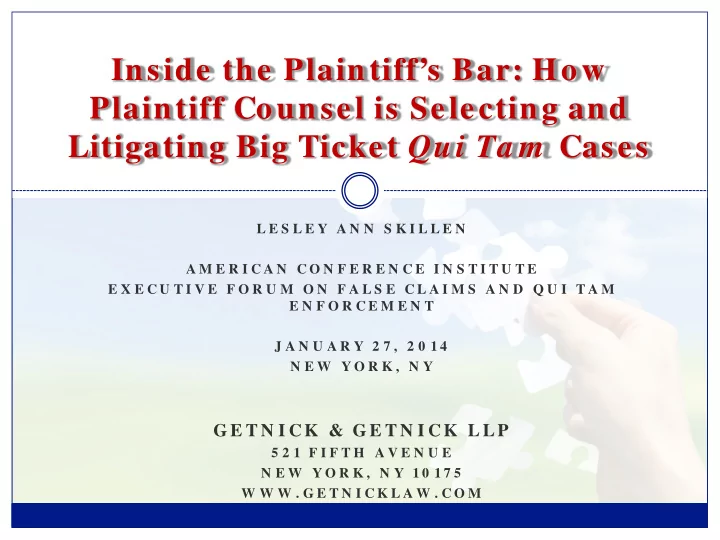

Inside the Plaintiff’s Bar: How Plaintiff Counsel is Selecting and Litigating Big Ticket Qui Ta m Cases L E S L E Y A N N S K I L L E N A M E R I C A N C O N F E R E N C E I N S T I T U T E E X E C U T I V E F O R U M O N F A L S E C L A I M S A N D Q U I T A M E N F O R C E M E N T J A N U A R Y 2 7 , 2 0 1 4 N E W Y O R K , N Y G E T N I CK & G E T N I CK L L P 5 2 1 F I F T H A V E N U E N E W Y O R K , N Y 1 0 1 7 5 W W W . G E T N I C K L A W . C O M
Key Factors in Evaluating Cases Relator’s knowledge and credibility FCA theory of liability Damages and recoverability Public interests to be vindicated Potential road blocks, e.g., relator involvement, public disclosure Getnick & Getnick LLP
Evaluating the Relator What is/ was relator’s relationship with defendant/ s and source of knowledge? Employee/ seniority Customer/ consumer, e.g., doctor, pharmacy, HMO, patient Competitor Vendor, e.g. consultant How extensive is the relator’s knowledge, e.g., expertise in industry, seniority in company? Credibility Can the relator clearly explain the fraud? Will the relator make a good witness? What motivated the relator to come forward? Getnick & Getnick LLP
Other Considerations If an employee: Did the relator report the fraud internally? Is the relator still employed at the company? If not, did the relator sign a severance agreement? Did the relator report to the government? Did the relator report promptly? Is there more than one relator? Multi-relator representation issues. Getnick & Getnick LLP
Evaluating the Case FCA analysis: What is the theory of liability? Which jurisdiction is best? Elements of liability, e.g., false certification Rule 9(b), public disclosure, first to file Damages theory Choice of USAO Public interests to be vindicated, e.g., patient harm, military personnel at risk, policy considerations What will the agency say? Getnick & Getnick LLP
What evidence does the relator have? Documents But we don’t want to see anything that is: Privileged Accessed without authority Random (e.g. a data dump of all of the company’s files) Relators make tapes! But make sure that recordings were made lawfully Determined by state law, e.g. NY is a one-party consent state See “Tape-recording laws at a glance,” Reporters Committee for Freedom of the Press http:/ / www.rcfp.org/ reporters- recording-guide/ tape-recording-laws-glance Getnick & Getnick LLP
What other evidence might be available? Witnesses the government should interview/ documents the government should subpoena? Consider prefiling investigation Will the relator be able to help the government interpret additional information? Getnick & Getnick LLP
Potential Roadblocks Need to satisfy FRCP 9(b) and 11: sufficiency of evidence Has someone else already filed a case? Is there a public disclosure concern? E.g. other cases, government reports, news media Was the relator involved in the fraud? Relator may have criminal exposure—should have the relator get advice from a criminal attorney Getnick & Getnick LLP
Additional Questions What employment issues is the relator facing? Possible Sec. 3730(h) retaliation claim Is this the right legal remedy for the relator? Potential consequences for the relator — professional and personal Getnick & Getnick LLP
Recommend
More recommend